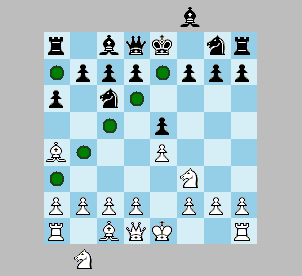External Link: Variable Chess
In Variable Chess (V-chess) the rules are the same as in orthodox chess except that a knight or a bishop is first placed outside the board. White first removes a light piece and then black removes one of his light pieces and places it behind the board. These pieces can at any time be introduced via any empty square on the first rank and move immediately, effectively a double-move. They can be introduced at any time, provided that a move exists that originates from the first rank. For instance, if the white queen has already moved away, a knight can be introduced via d1, thus reaching the square b2 (provided that it is empty). A bishop cannot be inserted on the same colour squares as the other bishop. Variable Chess is intended as an alternative to standard chess, radically increasing the ramification of openings. By waiting a few moves before introducing an external piece, a player can hide his strategical intentions. In an alternative variant, two light pieces per player are placed outside the board. In this case white removes his two pieces first. In this case white has chosen to place his queen knight outside the board, whereas black has removed the king bishop. The black-squared bishop can, if the player choses, move from b8 or f8. Captures can also occur. Black can, if he wishes, introduce his bishop via b8 to a7, where it is ideally placed. However, white can speed up the movement of the queen knight, which can reach g3 immediately, rather than going via d2 and f1, which is the usual route in the Ruy Lopez (Spanish opening).
You can download a Zillions implementation
In this case white has chosen to place his queen knight outside the board, whereas black has removed the king bishop. The black-squared bishop can, if the player choses, move from b8 or f8. Captures can also occur. Black can, if he wishes, introduce his bishop via b8 to a7, where it is ideally placed. However, white can speed up the movement of the queen knight, which can reach g3 immediately, rather than going via d2 and f1, which is the usual route in the Ruy Lopez (Spanish opening).
You can download a Zillions implementation  here.
here.
External Link: http://www.two-paths.com/bg/variablechess.htm
 This 'user submitted' page is a collaboration between the posting user and the Chess Variant Pages. Registered contributors to the Chess Variant Pages have the ability to post their own works, subject to review and editing by the Chess Variant Pages Editorial Staff.
This 'user submitted' page is a collaboration between the posting user and the Chess Variant Pages. Registered contributors to the Chess Variant Pages have the ability to post their own works, subject to review and editing by the Chess Variant Pages Editorial Staff.
By M Winther.
Web page created: 2012-11-10. Web page last updated: 2012-11-10